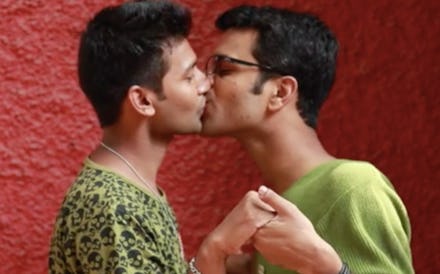India's Court Ruled Homosexuality Is a Crime. How These Couples Responded Is Beautiful

In December, India's Supreme Court overturned a lower court's previous decision that had decriminalized homosexuality. The top court's ruling declared same-sex intercourse and marriage illegal again, ending a four-year period of gay freedom.
At the time, human rights groups issued statements quibbling with the ruling. The Lawyers Collective, the legal group that advanced the case, called it "a major setback to LGBT rights," while Anjali Gopalan of the HIV/AIDS-focused Naz Foundation called it "a black day," adding, "We are being set back by 100 years."
Others have chosen to respond in a less verbal way. Kisses, a new video from Grapefruit Productions filmed at the Bangalore Queer Film Festival in February, tells the Indian government exactly what people think of the ban on same-sex love.
Kisses @Bangalore Queer Film Festival from bidu / Grapefruit Productions on Vimeo.
When the Supreme Court overturned the High Court's ruling, it denied that upholding Section 377, also known as the sodomy law, would infringe on individuals' rights to personal identity. "Section 377… does not criminalize a particular people or identity or orientation. It merely identifies certain acts which if committed would constitute an offense," the judgment states.
But the ruling marked a turning point: In the years before the 2009 decision to decriminalize sodomy, the homosexuality law hadn't been strictly enforced. The Supreme Court ruling, however, changed that attitude and opened the floodgates for public harassment, workplace discrimination and official corruption.
In a 2011 report on global LGBT rights, Charles Radcliffe of the UN Office for the High Commissioner on Human Rights said, "If the law essentially reflects homophobic sentiment, then it legitimizes homophobia in society at large. If the state treats people as second-class or second-rate or, worse, as criminals, then it's inviting people to do the same thing."
The election last month of Narendra Modi, India's new prime minister and leader of the Bharatiya Janata Party (BJP), further dampened dreams of a free and open gay culture in India. The BJP was the only major party to back the Supreme Court's ruling on Section 377, calling homosexuality "unnatural."
Image Credit: Getty
A recent comment from a spokesman of the Rashtriya Swayamsevak Sangh, a Hindu nationalist group and BJP's ideological parent, sparked hopes that enforcement of Section 377 could be relaxed. "Whether to call homosexuality a crime is questionable. In my view, glorification of certain forms of social behavior is not something we endorse. But the penalizing and criminalization aspects need to be looked into," Ram Madhav said.
Unlike many other countries, India has a more lax legal stance on gender rights than gay rights, after a landmark ruling in April officially recognized the transgender community.
"It is about time that India validates its claims to tolerance and inclusion," Lavanya R. Fischer and Devadatt Kamat wrote at the Indian Republic. "It is clear that the country has just come half way in the struggle for dignity of all her people."
Until India brings legalizes and legitimizes the rights of homosexuals, Indians will continue to protest the prohibitive law — either with words or, in the case of the video, with kisses to send a more powerful message.